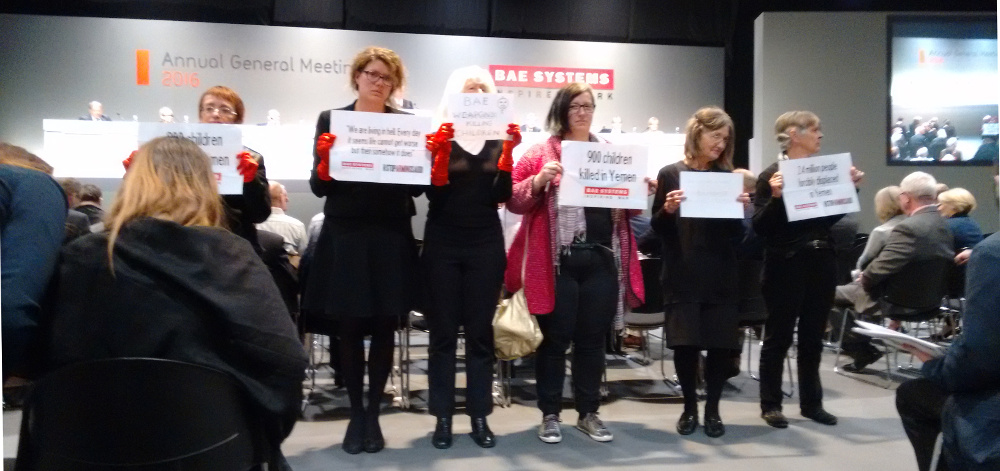Weapons manufacturer BAE Systems holds its Annual General Meeting today, but it’s not taking questions from shareholders.
We understand why it would want to hide from scrutiny: this is a company with plenty to be ashamed of. But as it continues to profit from violence around the world, we still have #QuestionsforBAE

BAE Systems is the UK’s largest arms company, and the sixth largest in the world. It is one of the primary beneficiaries of arms sales to Saudi Arabia, and profiting from the war in Yemen and it provides weapons to over 100 other countries around the world
Every year, as ‘token shareholders’, holding single shares in the company, CAAT supporters are able to attend BAE’s Annual General Meeting, question the Board and hold the company’s leadership to account.
This year, understandably, no public meeting can be held – but the company has taken this opportunity to remove any opportunities for shareholder engagement. We understand why: it doesn’t like answering awkward questions about its complicity and support for violence and human rights abuses around the world.
But these are important questions, so we’re asking them anyway. With your help to spread the word we can make sure it can’t escape scrutiny for its deadly work. #QuestionsForBAE #BAEAGM
Supporting repression in Saudi Arabia
BAE’s arms sales have supported Saudi Arabia’s authoritarian leaders for decades, helping them maintain their grip on power. When we ask BAE about the regime’s abuses, they talk up ‘reform’ within Saudi Arabia, while also denying any responsibility: “We are not here to judge the way that other governments work, we are here to do a job under the rules and regulations we are given.”
Yahya Assiri, a Saudi Arabian human rights activist, explains that Saudi authorities use weapons purchases to buy allies “to strengthen the regime and enable it to carry out more violations.”
Ameen, an Arabian human rights activist, tells BAE Systems it is a partner-in-crime with the Saudi regime. “Do you think you can wash your hands of what is happening in my home?”
“Let’s be clear. Your weapons brought nothing but terror, wars and instability.”
Julia, from ALQST, tells BAE Systems that reforms in Saudi Arabia introduced by Mohammed bin Salman “such as finally granting women the right to drive or to apply for their own passport … are at the very best cosmetic.”
The Kingdom’s political allies and business partners like BAE Systems continue to use the reformist narrative to legitimise their deals with the Saudi authorities –“We say this has to stop.”
Joshua asks “When will BAE Systems realise that instead of having a benign influence, these extensive dealings with Saudi Arabia only serve to give a green light for human rights abuses to be committed?”
- Read ALQST’s report into human rights in Saudi Arabia in 2019, a year in which the authorities “continued on their course of cracking down on any and all critical voices, targeting journalists, activists and bloggers in fresh waves of arrests”.
Complicity in the Yemen war
BAE’s weapons have been playing a central role in the Saudi-led Coalition’s airstrikes in Yemen. CAAT calculates that BAE has sold at least £15 billion in arms and services to the Saudi military since the start of its attacks on Yemen.
Ahmed Al-kolaibi, a human rights activist from Yemen, tells BAE Systems: “The arms trade must stop. The Saudi-led coalition must stop. And we call for an end to the war, to lift the blockade and help Yemenis to fight Covid-19.”
Reem from health advocacy charity Medact wants to know how BAE Systems justifies continuing to ship weapons and parts to Saudi Arabia during the pandemic, given calls from members of the UN Security Council and even from the UN Secretary General for a Global Ceasefire.
- Tell the UK government to turn its support for a #GlobalCeasefire into action and end UK arms sales now.
- Read more from Mwatana for Human Rights about attacks on healthcare facilities in Yemen
Anna has a powerful challenge for BAE Systems about its potential legal responsibility for complicity in possible crimes under international law committed in the war in Yemen.
“Whenever BAE Systems is asked about its exports to countries engaged in war, conflict or internal repression, the response received is that the company abides by the legal and policy framework set out by the government. But this is a useful fiction. “
Andrew Feinstein, author of the ‘Shadow World, Inside the Global Arms Trade’, Executive Director of Shadow World Investigations – and owner of a single share in BAE Systems, has two related questions.
Contracts with Israeli arms companies, marketing battle-tested weapons
Huda has #QuestionsForBAE about its ethics programme, in relation to its contracts with Elbit Systems, Israel’s largest private arms company. Elbit markets its weapons as battle-tested, because they test them on Palestinian civilians in Gaza.
Ceren Sagir, a member of Solidarity with the People of Turkey asks about BAE’s support for Turkey’s increasingly authoritarian government.
Research funding
BAE is training and supplying the Saudi bombing offensive in Yemen, where 2 million children are now without education. Ben a student at Oxford, where BAE provides research funding, asks “why is my education facilitating the disruption of the education of millions of others?”
Arms to Ventilators?
After news that BAE had joined the ‘Ventilator Challenge UK’ consortium, Caroline from CAAT asks about BAE’s plans to diversify in the future to create more socially useful products, including tackling the climate crisis.
Help to spread the word and make sure BAE can’t escape scrutiny for its deadly work.
Share the videos on Facebook and Twitter.
#QuestionsForBAE #BAEAGM

